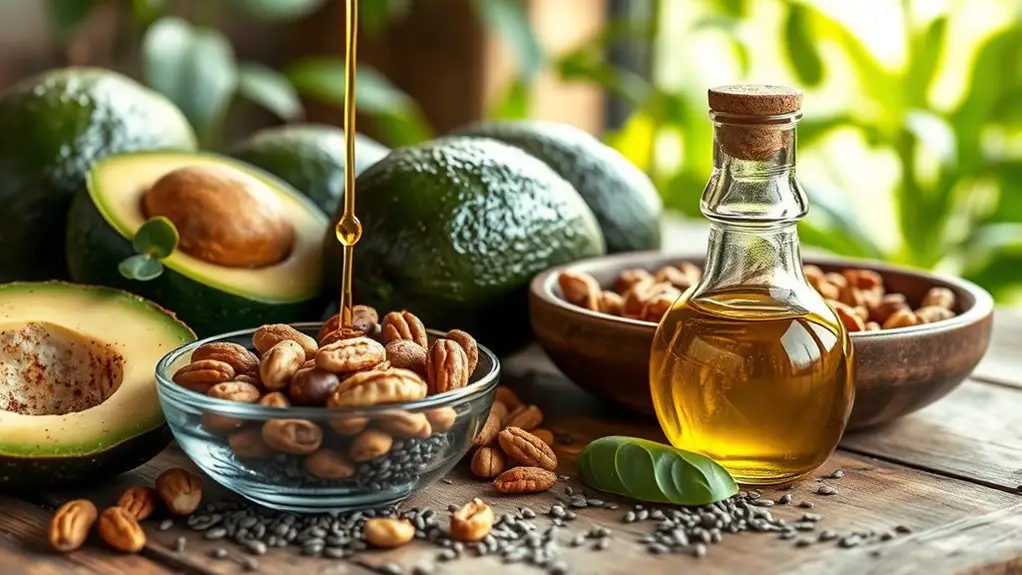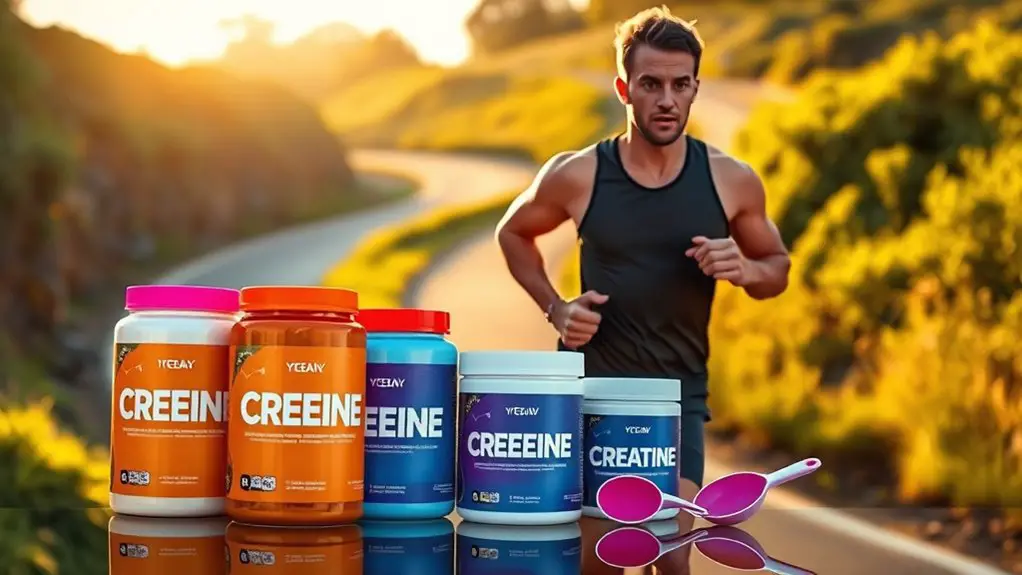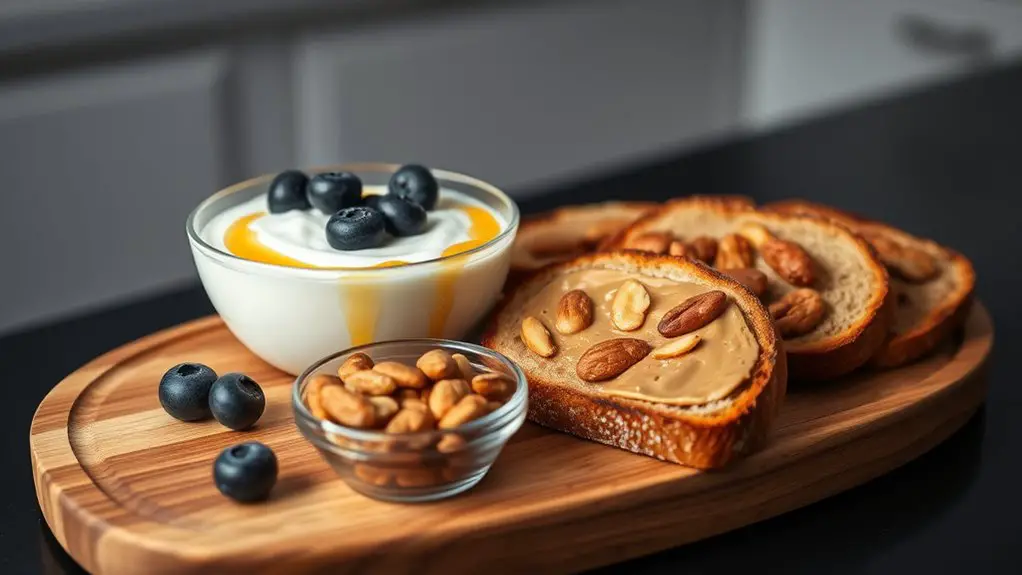To create a muscle-building meal plan, focus on balancing macronutrients. Include high-protein sources like lean meats and plant-based options, and make sure to fuel workouts with carbohydrates. Calculate your caloric needs by evaluating your Basal Metabolic Rate and activity level, then add calories for muscle gain. Eat balanced meals throughout the day, especially around workouts, for ideal recovery. If you want to refine your approach further, you'll discover more helpful strategies ahead.
Understanding Macronutrients for Muscle Growth
When you're aiming to build muscle, understanding macronutrients is essential because they provide the energy and building blocks your body needs. Macronutrients consist of proteins, fats, and carbohydrates, each playing a unique role in muscle growth. Proteins are vital for repairing and building muscle tissue, so don't skimp on sources like lean meats, legumes, and dairy. Carbs fuel your workouts, giving you the endurance to push limits and chase freedom in your fitness journey. Healthy fats support hormone production, helping to regulate muscle growth and overall health. By balancing these macronutrients in your meals, you'll empower your body to achieve its full potential. Embrace this knowledge, and you'll feel more free and capable in your pursuit of strength.
Calculating Your Caloric Needs
To effectively build muscle, you need to know how many calories your body requires. This isn't just about eating more; it's about eating smart. Here's how to calculate your caloric needs:
To build muscle effectively, understand your caloric needs and focus on smart eating, not just eating more.
- Determine Your Basal Metabolic Rate (BMR): This is the number of calories your body burns at rest. You can use online calculators for accuracy.
- Factor in Your Activity Level: Multiply your BMR by an activity factor (sedentary, lightly active, moderately active, very active) to get your Total Daily Energy Expenditure (TDEE).
- Adjust for Muscle Gain: Add around 250-500 calories to your TDEE, depending on your goals and how quickly you want to gain muscle.
Understanding these numbers empowers you to create a meal plan that fuels your freedom to grow.
Importance of Meal Timing
Meal timing plays an essential role in maximizing your muscle-building efforts, as it can influence both your energy levels and recovery. Eating at the right times helps fuel your workouts and promotes effective recovery afterward. You don't need to rigidly schedule every meal, but try to consume a balanced meal or snack every few hours. This keeps your body primed with nutrients, supporting your muscle growth.
Post-workout nutrition is particularly important; having a meal or shake within an hour can kickstart recovery and muscle repair. Listen to your body's hunger cues and adjust your meal times accordingly. By finding a rhythm that works for you, you can enjoy the freedom of flexibility while still reaping the benefits of proper meal timing.
Best Protein Sources for Muscle Building
Fueling your workouts and recovery isn't just about timing; it's also about the quality of the nutrients you consume. Protein is essential for muscle building, and choosing the right sources can make a significant difference. Here are three of the best protein sources you should consider:
- Lean meats: Chicken, turkey, and lean cuts of beef are packed with high-quality protein and essential amino acids, vital for muscle repair and growth.
- Fish: Salmon and tuna not only provide protein but also omega-3 fatty acids, which help reduce inflammation and support recovery.
- Plant-based options: Lentils, chickpeas, and quinoa offer protein along with fiber and other nutrients, making them excellent choices for those seeking a more plant-focused diet.
Incorporate these into your meal plan for best results!
Carbohydrates: Fueling Your Workouts
While protein is essential for muscle growth, carbohydrates play an equally important role in fueling your workouts and enhancing performance. Carbs are your body's primary energy source, providing the stamina you need to push through intense sessions. When you consume carbohydrates, they're broken down into glucose, which powers your muscles.
Incorporating complex carbs like whole grains, fruits, and veggies into your meal plan guarantees you've got sustained energy for longer workouts. Don't shy away from quick-digesting carbs like bananas or rice cakes before your training—they can give you that extra boost. Remember, the right balance of carbs can make all the difference in your performance, helping you achieve the freedom to train hard and reach your fitness goals.
Healthy Fats and Their Role in Recovery
After intense workouts, your body needs more than just carbohydrates for recovery; healthy fats play a significant role too. They help reduce inflammation, support hormone production, and provide essential nutrients. Here's why you should include them in your meal plan:
Healthy fats are crucial for post-workout recovery, aiding inflammation reduction, hormone balance, and nutrient absorption.
- Inflammation Reduction: Healthy fats, like omega-3s found in fish and flaxseeds, can help decrease muscle soreness and speed up recovery.
- Hormone Balance: Fats are important for producing hormones like testosterone, which is essential for muscle growth and recovery.
- Nutrient Absorption: Including healthy fats aids in the absorption of fat-soluble vitamins (A, D, E, K), enhancing your overall nutrition.
Sample Muscle-Building Meal Plan
Creating an effective muscle-building meal plan can seem challenging, but it doesn't have to be. Start your day with scrambled eggs, spinach, and whole-grain toast. For lunch, consider grilled chicken breast, quinoa, and steamed broccoli. Snack on Greek yogurt with berries to keep your energy up. Dinner can be a lean steak, sweet potatoes, and a side salad. Don't forget to hydrate!
Feel free to mix and match your proteins, carbs, and veggies. You can swap chicken for fish or try brown rice instead of quinoa. The key is to guarantee you're getting enough calories and nutrients to fuel your workouts and recovery. With a bit of creativity, you can enjoy delicious meals while building muscle.
Supplements to Consider
To maximize your muscle-building efforts, you might want to contemplate incorporating certain supplements into your routine. Supplements can provide that extra boost, helping you reach your goals without restricting your freedom. Here are three you might consider:
Consider adding supplements to enhance your muscle-building journey and reach your fitness goals more effectively.
- Protein Powder: Convenient for post-workout recovery, it helps repair muscles and promotes growth.
- Creatine: Known for enhancing strength and performance, it can help you push through those intense workouts.
- Branched-Chain Amino Acids (BCAAs): These can reduce muscle soreness and improve recovery, allowing you to train harder and more frequently.
Hydration and Its Impact on Performance
While you might focus on your workout and meal plan, don't underestimate the importance of hydration in your muscle-building journey. Staying properly hydrated isn't just about quenching your thirst; it directly impacts your performance and recovery. When you're well-hydrated, your muscles function better, allowing you to push harder during workouts. Dehydration can lead to fatigue, reduced strength, and even cramps, holding you back from reaching your goals.
Aim for at least half your body weight in ounces of water daily, adjusting for sweat loss during intense training. Remember, hydration isn't a one-time thing—it's an ongoing commitment. So grab that water bottle, sip throughout the day, and feel the difference in your workouts. Your body will thank you for it!
Adjusting Your Meal Plan for Progress
As you progress on your muscle-building journey, it is vital to adjust your meal plan to meet your evolving needs. Here are three key adjustments you should consider:
- Caloric Intake: As your workouts intensify, you may need to increase your caloric intake to fuel your growth. Monitor your weight and adjust accordingly to guarantee you're in a surplus.
- Macronutrient Ratios: Tweak your protein, carb, and fat ratios based on your performance. More carbs can boost energy for heavier lifts, while protein remains critical for recovery.
- Meal Timing: Experiment with meal timing around your workouts. Eating a balanced meal or snack pre- and post-workout can enhance your performance and recovery.
Embrace these adjustments, and enjoy the freedom to tailor your nutrition as you evolve!
Frequently Asked Questions
How Often Should I Change My Meal Plan?
You'd think changing your meal plan often means keeping things exciting, right? But really, sticking to a plan for a few weeks allows your body to adapt. Then, switch it up when you hit a plateau.
Can I Build Muscle on a Vegetarian Diet?
Absolutely, you can build muscle on a vegetarian diet! Focus on protein-rich foods like legumes, tofu, and quinoa. Balancing your meals with healthy fats and carbs will support your muscle growth while maintaining your freedom in food choices.
What Snacks Are Best for Muscle Recovery?
For muscle recovery, you'll want snacks rich in protein and healthy fats. Think Greek yogurt with fruit, nut butter on whole grain toast, or a protein smoothie. They'll help your muscles bounce back stronger!
How Do Stress Levels Affect Muscle Growth?
Stress levels can negatively impact muscle growth by increasing cortisol, which can hinder protein synthesis. When you manage stress effectively, you'll create a better environment for your muscles to recover and grow stronger.
What Role Does Sleep Play in Muscle Building?
Sleep's essential for muscle building; it's when your body repairs and grows. If you don't get enough rest, you're limiting your gains. Prioritizing quality sleep can maximize your recovery and growth potential.




